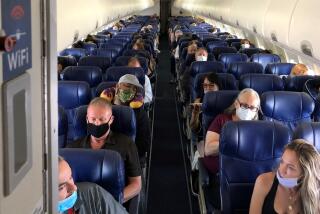‘We Want to Make It Too Difficult’ : Pilots to Push for Boycott of Terrorists’ Supporters
- Share via
WASHINGTON — The Air Line Pilots Assn. announced Friday that it will send delegates to the International Federation of Air Line Pilots meeting in London next week to press for action on a proposal that all 65,000 members of the international group boycott any nation that sponsors air terrorism or harbors those who perpetrate it.
The proposal names no nations, but a prime target is clearly Libya, which the United States has charged is a source of terrorism.
“There’s no wonder drug, no single approach to combatting terrorism, and we may never eradicate it, but we want to make it too difficult, too expensive, too prohibitive for terrorists and the countries that support them, and if we do, a lot of it will dry up,” said John Mazor, spokesman for the U.S. pilots’ association.
The difficulties of trying to prevent incidents like the explosion that killed four Americans on Wednesday on a TWA jet en route to Athens airport were underscored by a report from the Federal Aviation Administration that the Cairo airport met International Civil Aviation Organization security standards last month.
International Investigation
There has been speculation that the bomb that exploded aboard TWA Flight 840 was placed on the plane by a woman who boarded the Rome-bound jet at Cairo and left at Athens, about six hours before the explosion occurred on the return flight to Athens. American officials refused Friday to confirm this theory pending an international investigation centered on Athens, but disclosure of the recent FAA survey at Cairo seemed to imply U.S. clearance of Egyptian security procedures.
Meanwhile, Bahie Din Nasa, Egypt’s deputy minister of tourism, told the Associated Press in Cairo that May Elias Mansour, the woman accused by Greek and Italian authorities of planting the bomb under a seat in the plane’s 10th row, had indeed boarded the flight at Cairo but said she underwent a luggage check and body search.
Other experts from government and the private sector seconded Mazor’s finding that, while commercial aviation may never be made absolutely secure from terrorism, vigilant effort can hold it to a minimum.
They basically advocated a double-edged approach, one part rigorous enforcement of security procedures and the other part continuing research on techniques and devices to detect weapons and explosives in and around aircraft.
Third World Perils
The experts agreed that aviation security is suspect in some nations of the Third World, especially in the eastern Mediterranean, but meets high standards in the world’s industrialized nations.
In the United States, a sufficiently high degree of expertise has been developed for FBI Director William H. Webster to make a point of citing his agency’s record of interdicting terrorist plots and noting an increasing degree of cooperation with Western European agencies to combat terrorism.
In the view of Jerry Rees, North American executive director of Control Risks Inc., international security consultants, the combination of X-rays, magnetometers, body searches and specially trained dogs that makes up modern airport security still is not “absolute.” Its goal, he said, is rather to “set the security level at a point that will cope with the existing risks,” but it still must be constantly upgraded.
To speed this process, the FAA has budgeted $12 million this year for research into devices which the agency hopes will be able to sniff out concealed explosives more effectively than the trained dogs now used for this exacting work. According to Joann Sloane, an FAA spokesman, a study contract has been assigned to Westinghouse Electric Corp., with instructions to file a feasibility report by Aug. 1, but development of completed equipment appears to be at least two years down the road.
Sensors Needed
If dependable sensors can be developed, they could close a gap that may have allowed a bomb to be planted on TWA Flight 840. Although officials at FAA, the FBI and the Treasury Department’s Alcohol, Tobacco and Firearms Bureau avoided any confirmation, there was speculation that the device could have been one in which so little metal was used for its wiring and detonator that it got past the metal detector used to screen passengers and the X-ray that scans luggage at the Cairo airport.
Alternatively, Mazor suggested, the device could have been put on the plane by some member of a maintenance crew, possibly at Athens, where he said many immigrants from troubled Middle Eastern nations work at the airport. He suggested that there should be much more exhaustive background checks of overseas airport workers, but conceded that the cost--which would probably be borne directly or indirectly by the airlines--would be considerable.
More to Read
Sign up for Essential California
The most important California stories and recommendations in your inbox every morning.
You may occasionally receive promotional content from the Los Angeles Times.












